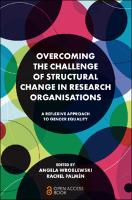Overcoming the Challenge of Structural Change in Research Organisations
A Reflexive Approach to Gender Equality
| dc.contributor.editor | Wroblewski, Angela | |
| dc.contributor.editor | Palmen, Rachel | |
| dc.date.accessioned | 2022-07-21T09:55:32Z | |
| dc.date.available | 2022-07-21T09:55:32Z | |
| dc.date.issued | 2022 | |
| dc.identifier | OCN: 1341401774 | |
| dc.identifier.uri | https://library.oapen.org/handle/20.500.12657/57559 | |
| dc.description.abstract | The ebook edition of this title is Open Access and freely available to read online. The under-representation of women in research and innovation has been documented as a global phenomenon and is particularly heightened on decision-making boards and in leadership positions. Presenting a reflexive approach to gender equality for research organisations developed within the TARGET project, funded by the European Commission, the authors describe the experiences of the project’s implementation in seven Gender Equality Innovating Institutions in the Mediterranean basin - including research performing organisations, research funding organisations and a network of universities. The TARGET approach goes beyond the formal adoption of a gender equality policy by emphasising an iterative and reflexive process towards equality at the institutional level as well as the establishment of a community of practice for gender equality within the institution. The approach is based on the assumption that actual change is the result of increased institutional willingness and capacity to identify, reflect on and address gender bias in a sustained way. Starting point and anchor of the process is a tailored gender equality plan for each institution. A specific characteristic of TARGET is the fact that implementing institutions are located in countries which have been characterised as relatively ‘inactive’ in developing gender equality policies in science and research. Therefore, internal and external communication about the relevance of gender equality in science and research forms an important element of a reflexive gender equality policy in contexts which are characterised by resistances, anti-genderism and traditional gender roles. This book will therefore be essential reading for higher education leaders and managers, and staff at all levels committed to achieving gender equity in higher education. This project has received funding from the European Union’s Horizon 2020 research and innovation programme. | en_US |
| dc.language | English | en_US |
| dc.subject.classification | thema EDItEUR::J Society and Social Sciences::JB Society and culture: general::JBS Social groups, communities and identities::JBSF Gender studies, gender groups | en_US |
| dc.subject.classification | thema EDItEUR::J Society and Social Sciences::JB Society and culture: general::JBF Social and ethical issues::JBFA Social discrimination and social justice | en_US |
| dc.subject.classification | thema EDItEUR::J Society and Social Sciences::JN Education::JNM Higher education, tertiary education | en_US |
| dc.subject.other | Institutional Change;Gender Equality Plans;Gender Equality Policy;Research Organisations;Academia;Structural Change | en_US |
| dc.title | Overcoming the Challenge of Structural Change in Research Organisations | en_US |
| dc.title.alternative | A Reflexive Approach to Gender Equality | en_US |
| dc.type | book | |
| oapen.relation.isPublishedBy | 7a29cc03-8a4f-45a6-b05d-e88901e20f36 | en_US |
| oapen.relation.isbn | 9781802621228 | en_US |
| oapen.imprint | Emerald Publishing Limited | en_US |
| oapen.pages | 240 | en_US |
| oapen.place.publication | Bingley | en_US |

